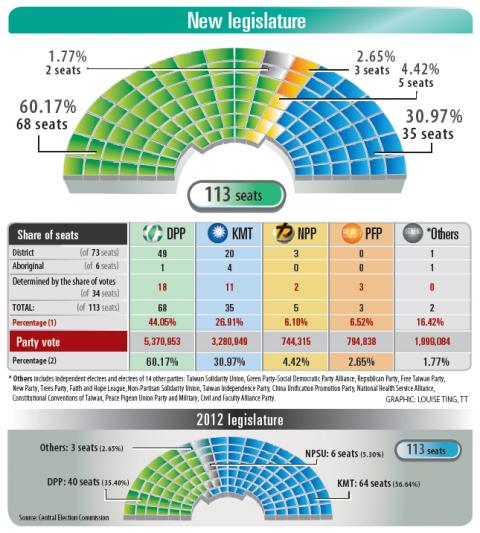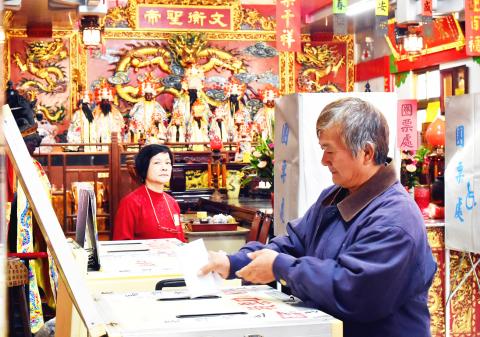The Democratic Progressive Party (DPP) won a legislative majority in yesterday’s election, securing 68 seats in the 113-seat legislature. With its ally the New Power Party (NPP) winning five legislative seats, the DPP is expected to enjoy unrestricted power in the parliament.
Before the elections, the DPP had called on voters to cast their legislative ballots for the party’s candidates to help it secure a majority in the legislature without the NPP’s assistance.
The Chinese Nationalist Party (KMT), which held 64 legislative seats before the election, hoped to secure at least 38 seats to prevent the majority party or alliance to motion for a recall of the president, which can be done with a two-thirds majority in the legislature. The DPP got what it wanted, but not the KMT.

Graphic: Louise Ting, Taipei Times
DPP president-elect Tsai Ing-wen’s (蔡英文) “coattail effect” has helped the party sweep legislative votes.
However, the real force that carried the opposition parties to victory is probably the “awakened youth,” who have been calling for the removal of the KMT from government since 2014’s Sunflower movement.
The NPP, which was established in the movement’s wake, fielded three political novices in the election — a leading activist in the Sunflower movement, a famous metal singer and a victim-turned symbol of nationwide demonstrations against abuse in the military — as its regional legislative candidates. All three got elected, defeating three veteran KMT lawmakers.

Photo: Chang Chung-yi, Taipei Times
However, while the NPP has won representation in the legislature as expected, the 5 percent threshold has proved to be a hurdle for other small parties, such as the Green Party-Social Democratic Party Alliance, the Republican Party and the Faith and Hope League, which are among parties that were established following the Sunflower movement.
The Taiwan Solidarity Union, which had three seats in the 2012 legislature, failed to cross the 5 percent threshold this time. The rise of the NPP was definitely a factor, but its decision to team up with Le Flanc Radical, a Taiwan-independence group consisting of young people, has been considered a move that came too late to garner young votes.
The People First Party’s (PFP) crossing the threshold might be seen as a coattail effect of its party chairman and presidential candidate James Soong (宋楚瑜). It was said that Soong’s bid, which was his third, was a ploy to campaign for party votes. It remains to be seen how the PFP would retain its so-called “non-blue, non-green and middle way” in a pan-green parliament.
The New Party, which received tacit support from Deputy Speaker Hung Hsiu-chu (洪秀柱) of the KMT and other KMT members who were dissatisfied with the party’s at-large legislative candidate list, made gains, winning more than 4 percent of party votes, while having only won 1.49 percent of the votes in 2012.
With the KMT’s rout, the distribution of the political power within the KMT and the pan-blue camp as a whole would be followed closely.
An interesting point raised by commentators is how the forced apology of Korean pop music group member Chou Tzu-yu (周子瑜) affected young voters and the elections’ outcome. It has been said that many young people decided to vote after the incident, in defiance of pressure from China. The DPP’s victory, in terms of its gains in party votes compared with what was expected, is said to be an outcome of the incident.
The KMT had secured 64 seats in a 113-seat legislature in 2012, while the DPP had 40 seats, the Taiwan Solidarity Union and the PFP each had 3, the Non-Partisan Solidarity Union had 2 and independents, 4.

An essay competition jointly organized by a local writing society and a publisher affiliated with the Chinese Communist Party (CCP) might have contravened the Act Governing Relations Between the People of the Taiwan Area and the Mainland Area (臺灣地區與大陸地區人民關係條例), the Mainland Affairs Council (MAC) said on Thursday. “In this case, the partner organization is clearly an agency under the CCP’s Fujian Provincial Committee,” MAC Deputy Minister and spokesperson Liang Wen-chieh (梁文傑) said at a news briefing in Taipei. “It also involves bringing Taiwanese students to China with all-expenses-paid arrangements to attend award ceremonies and camps,” Liang said. Those two “characteristics” are typically sufficient

A magnitude 5.9 earthquake that struck about 33km off the coast of Hualien City was the "main shock" in a series of quakes in the area, with aftershocks expected over the next three days, the Central Weather Administration (CWA) said yesterday. Prior to the magnitude 5.9 quake shaking most of Taiwan at 6:53pm yesterday, six other earthquakes stronger than a magnitude of 4, starting with a magnitude 5.5 quake at 6:09pm, occurred in the area. CWA Seismological Center Director Wu Chien-fu (吳健富) confirmed that the quakes were all part of the same series and that the magnitude 5.5 temblor was

The brilliant blue waters, thick foliage and bucolic atmosphere on this seemingly idyllic archipelago deep in the Pacific Ocean belie the key role it now plays in a titanic geopolitical struggle. Palau is again on the front line as China, and the US and its allies prepare their forces in an intensifying contest for control over the Asia-Pacific region. The democratic nation of just 17,000 people hosts US-controlled airstrips and soon-to-be-completed radar installations that the US military describes as “critical” to monitoring vast swathes of water and airspace. It is also a key piece of the second island chain, a string of

The Central Weather Administration has issued a heat alert for southeastern Taiwan, warning of temperatures as high as 36°C today, while alerting some coastal areas of strong winds later in the day. Kaohsiung’s Neimen District (內門) and Pingtung County’s Neipu Township (內埔) are under an orange heat alert, which warns of temperatures as high as 36°C for three consecutive days, the CWA said, citing southwest winds. The heat would also extend to Tainan’s Nansi (楠西) and Yujing (玉井) districts, as well as Pingtung’s Gaoshu (高樹), Yanpu (鹽埔) and Majia (瑪家) townships, it said, forecasting highs of up to 36°C in those areas